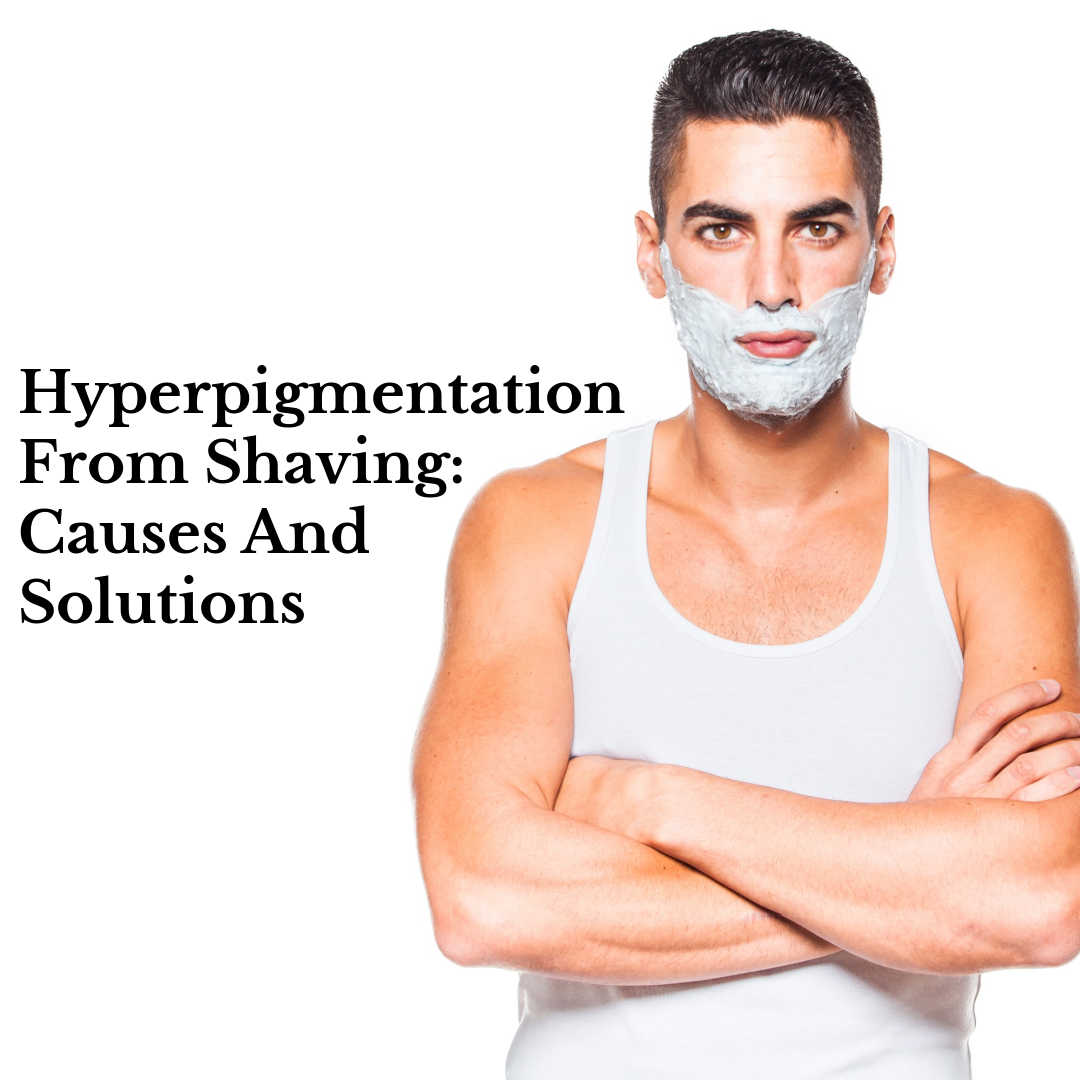
Dealing with hyperpigmentation from shaving can be frustrating and downright embarrassing, especially when it affects visible areas of the body. This skin issue can be caused by various factors such as skin inflammation, ingrown hairs, or even improper shaving techniques.
In this blog post, I’ll explore the causes, triggers, and solutions for managing hyperpigmentation resulting from shaving.
Hyperpigmentation And Shaving – Key Takeaways
- Shaving can cause hyperpigmentation, which is characterized by dark spots and discoloration on the skin due to inflammation and irritation caused by shaving.
- Various factors such as skin abrasions, razor bumps, sun exposure, hormonal changes, medical conditions, and others can trigger hyperpigmentation from shaving.
- Proper pre-shave preparation with gentle cleansing, exfoliating, applying pre-shave oil or lotion, using a sharp and clean razor blade along with non-irritating shaving gel or cream in the direction of hair growth and after-shave care are crucial steps to prevent hyperpigmentation from occurring.
- Natural remedies such as lemon juice or apple cider vinegar to lighten dark spots and exfoliating regularly to remove dead skin cells along with medical treatments for hyperpigmentation like chemical peels or laser therapy are some solutions that can be effective in treating existing issues related to hyperpigmentation from shaving.
What Is Hyperpigmentation?
Hyperpigmentation is a common skin condition caused by excessive production of melanin, a pigment that gives skin its color. It is characterized by darkened areas of skin. While it is not necessarily a medical condition, it can be a symptom of an underlying health issue.

There are several types of hyperpigmentation, including melasma, sunspots, and post-inflammatory hyperpigmentation. Increased sun exposure and inflammation are the primary risk factors for developing hyperpigmentation. Medications, hormonal changes during pregnancy, and certain medical conditions can also cause the condition.
Tips And Tricks For Preventing Hyperpigmentation From Shaving
Proper pre-shave preparation, choosing the right shaving products, and using the best shaving techniques can minimize skin trauma and prevent hyperpigmentation from shaving.
Pre-Shave Preparation
In order to prevent hyperpigmentation from shaving, it’s important to prepare your skin properly before you begin. Follow these tips to ensure that your skin is as healthy and protected as possible:
1. Cleanse your skin thoroughly with a gentle face wash or soap. This removes any dead skin cells and excess oil that can clog up your pores and cause razor bumps.
2. Occasionally exfoliate with a scrub or chemical exfoliant, depending on your preferences. This step helps to remove built-up sweat, dirt, and grime from the surface of your skin while also helping to prevent ingrown hairs.
3. Apply a pre-shave oil or lotion to protect the surface of your skin and provide lubrication for the razor blade. This step also helps to reduce friction between the blade and your skin, which can minimize tugging and pulling.
4. Soak a clean towel in hot water and hold it against your face for several minutes before shaving. This helps to soften the hair follicles so that they’re easier to cut during shaving.
5. Make sure that your razor blade is sharp and clean before using it on your skin. Dull blades can pull at hairs rather than cutting them cleanly, which can lead to irritation and razor bumps.
Choosing The Right Shaving Products
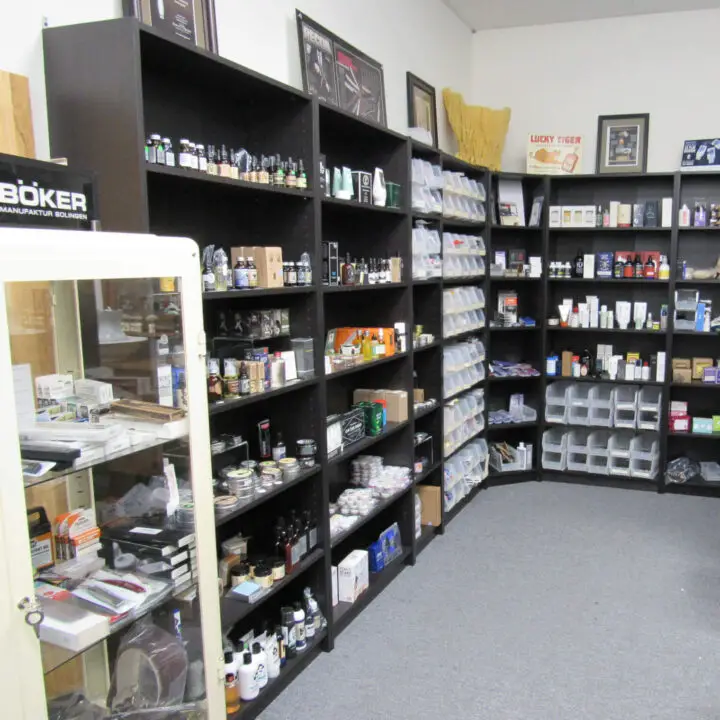
One of the most crucial steps in preventing hyperpigmentation from shaving is choosing the right products. Men who wet shave should opt for high-quality, gentle shaving creams and soaps that provide a smooth glide while protecting their skin’s natural moisture barrier.
Alcohol-based aftershaves can be harsh on the skin and may cause inflammation and irritation leading to dark spots. Instead, men with sensitive or acne-prone skin should choose an alcohol-free product like Witch Hazel extracts which have anti-inflammatory properties that soothe irritated skin.
They should also avoid using dull razors as they increase the risk of cuts and ingrown hairs that lead to pseudofolliculitis barbae.
Best Shaving Techniques To Minimize Skin Trauma
It’s easy to minimize skin trauma and reduce the likelihood of developing hyperpigmentation from shaving by following these best practices:
1. Prep your skin: Before you begin shaving, prepare your skin by washing with warm water and using a gentle cleanser. This helps soften hair follicles and reduce the risk of irritation.
2. Choose the right razor: Invest in a high-quality razor that is suitable for your skin type. A sharp blade will minimize tugging on your hair, reducing the risk of ingrown hairs.
3. Shave with a mind to the direction of hair growth: Shaving against the grain can cause irritation and inflammation, leading to post-inflammatory hyperpigmentation (PIH). Instead, shave in the direction of hair growth and/or across the direction of hair growth, with short strokes.
4. Use non-irritating shaving product: Using a high-quality shaving soap or cream lubricates your skin, minimizing friction and reducing trauma during shaves.
5. Rinse the razor often: Rinse your razor blade after every few strokes to avoid clogging or buildup that may damage your skin and create razor bumps.
After-Shave Care And Maintenance Of Skin Health
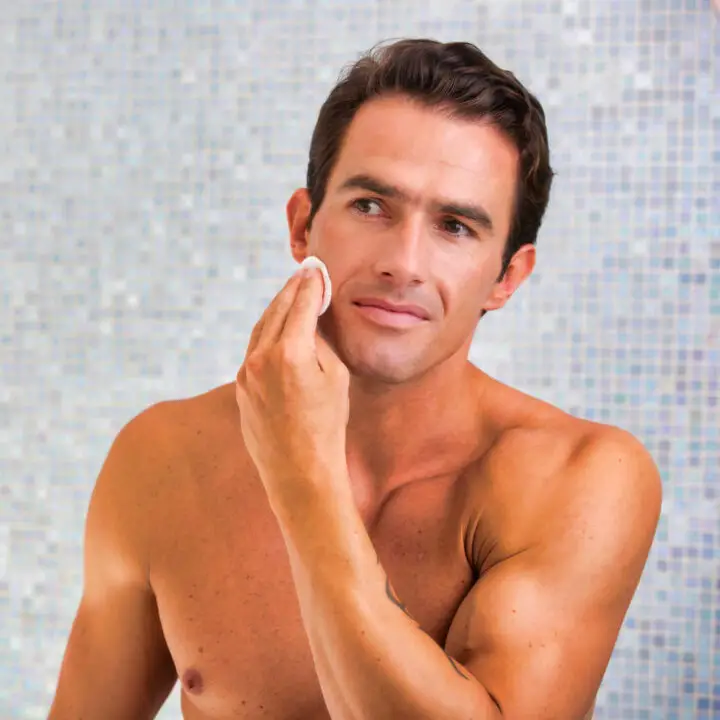
Taking care of your skin after shaving is just as important as preparing for it. Here are some tips to keep your skin healthy and irritation-free:
1. Rinse your face thoroughly with warm water to remove any leftover shaving lather. Follow up with cool water to refresh your skin.
2. Pat dry with a clean towel, do not rub your skin, as this can cause irritation.
3. Apply a moisturizing aftershave lotion or balm to soothe the skin and prevent dryness.
4. Avoid using alcohol-based products, which can cause further irritation and dryness.
5. Reapply sunscreen if you shaved in the morning as shaving removes some of the sunscreen applied earlier in the day.
6. Clean your razor blade properly before storing it away to avoid bacteria build-up.
7. Replace blades when they become dull, as old blades can cause more irritation and nicks.
8. Lastly, maintain overall skin health by getting enough sleep, eating well-balanced meals, and staying hydrated throughout the day!
Solutions For Hyperpigmentation From Shaving
There are several natural remedies for hyperpigmentation from shaving, such as using lemon juice or apple cider vinegar to lighten dark spots and exfoliating regularly to remove dead skin cells.
Natural Remedies
For men who wet shave, hyperpigmentation can be an annoying problem, but there are natural remedies that can help reduce dark spots caused by shaving. Here are some of the solutions you might want to try:
1. Lemon Juice: Its bleaching properties make it an effective natural remedy for hyperpigmentation. Apply the juice directly to the affected area and leave it on for 10-15 minutes before rinsing it off with warm water.
2. Aloe Vera: The anti-inflammatory and skin-healing properties of aloe vera can help lighten dark spots. Apply fresh aloe vera gel directly to the affected area and leave it on for about 30 minutes before washing it off.
3. Vitamin E oil: An antioxidant, vitamin E is excellent at preventing and treating hyperpigmentation by repairing damaged skin cells. Gently massage the oil onto your skin after shaving.
4. Turmeric: Its anti-inflammatory and antiseptic properties make turmeric useful in treating various skin conditions including hyperpigmentation. Mix one tablespoon of turmeric with two tablespoons of milk or honey to form a paste, then apply to the affected area and leave for about 20 minutes before rinsing off.
5. Papaya: This fruit contains enzymes that can break down melanin in your skin, hence reducing pigmentation marks. Mash papaya into a pulp and apply onto your face for 20 minutes before rinsing off with water.
Medical Treatments For Hyperpigmentation
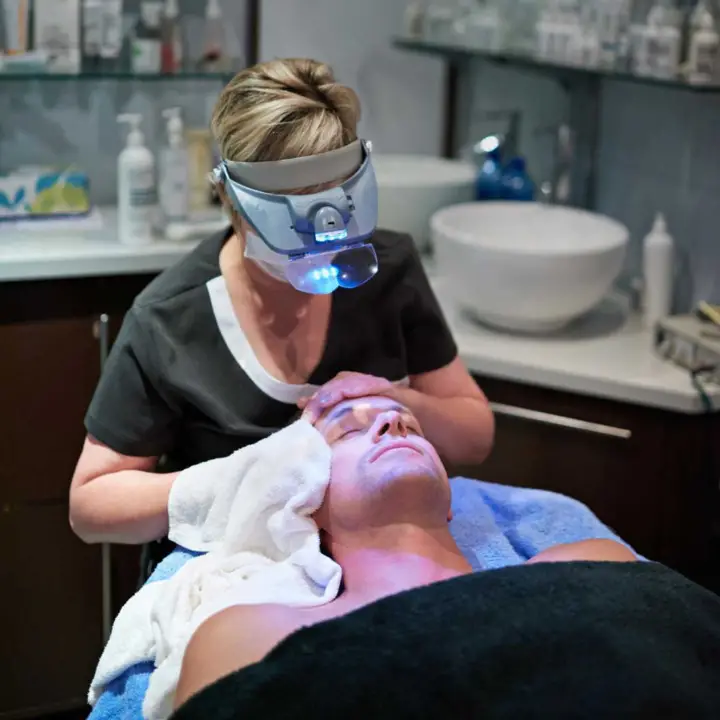
Hyperpigmentation can be treated with various medical treatments that help to reduce the appearance of dark spots on the skin caused by shaving. Here are some commonly used medical treatments for hyperpigmentation:
1. IPL (Intense Pulsed Light) Therapy: It is a non-invasive treatment that uses light energy to target and destroy melanin-producing cells in the skin. IPL therapy helps to improve the appearance of hyperpigmentation caused by sun damage, aging, and hormonal changes.
2. Chemical Peels: Chemical peels containing glycolic acid or salicylic acid can be used to treat hyperpigmentation caused by shaving. These peels work by removing dead skin cells and promoting new cell growth, leading to brighter and more even-toned skin.
3. Topical Treatments: Topical depigmenting agents such as hydroquinone, retinoids, and azelaic acid can be applied to the skin to help reduce the appearance of hyperpigmentation caused by shaving. These products work by inhibiting melanin production in the affected areas.
4. Dermabrasion: Dermabrasion is a procedure that involves using a rotating brush or diamond wheel to exfoliate the top layer of skin, which helps remove dark spots caused by shaving.
Remember to consult with a dermatologist before starting any medical treatment for hyperpigmentation caused by shaving as every person’s skin reacts differently to different treatments.
Understanding Hyperpigmentation From Shaving: Causes And Triggers
Various factors can contribute to the development of hyperpigmentation, especially for men who wet shave. Understanding these causes and triggers can help prevent unwanted dark spots and uneven skin tone. Some notable factors include:
1. Skin irritation: Shaving can sometimes cause irritation which leads to inflammation, increasing the likelihood of hyperpigmentation.
2. Inflammation: The body’s immune response to shaving-induced skin damage may result in post-inflammatory hyperpigmentation.
3. Skin abrasions: Cuts and nicks from shaving can lead to increased melanin production, causing darkened patches on the skin.
4. Razor bumps: Improper shaving techniques may result in ingrown hairs and razor bumps, contributing to hyperpigmentation.
5. Post-inflammatory hyperpigmentation: This type of dyschromia often occurs after skin injuries, such as those sustained during wet shaving.
6. Dyschromias: Skin conditions and disorders of the uniformity of the skin’s pigmentation in individuals with darker skin tones.
7. Sun exposure: Excessive sun exposure can worsen existing hyperpigmentation or trigger new cases due to increased melanin production.
8. Melasma: This specific type of hyperpigmentation may be caused by hormonal changes or sun exposure and is more common in women but can also affect men.
9. Hormonal changes: Fluctuations in hormone levels, such as during pregnancy or medication use, can contribute to the onset of melasma-related pigmentation issues.
10. Medical conditions: Certain underlying health conditions like thyroid dysfunction or Addison’s disease can cause changes in melanin production leading to hyperpigmentation.
By being aware of these causes and triggers, men who wet shave can take necessary precautions to minimize their risk for developing unwanted dark spots on their skin.
Skin Types More Prone To Hyperpigmentation
Hyperpigmentation can affect anyone, but some skin types are more susceptible to developing dark spots and uneven skin tone after shaving. Men with medium to dark complexions are particularly prone to post-inflammatory hyperpigmentation (PIH), a type of discoloration that occurs as the skin heals from inflammation or injury.
Various factors can trigger PIH, such as nicks, cuts or razor burns resulting from wet shaving. For example, a man accidentally nicking his neck while trying out a new razor may notice that even after the cut has healed weeks later, there still remains an unsightly dark mark on his previously flawless complexion.
I once tried to stupidly remove a facial skin tag myself, which resulted in hyperpigmentation
Specific Areas Of The Body Prone To Hyperpigmentation Affected By Shaving
Shaving can sometimes lead to hyperpigmentation in specific areas of the body. The face, especially the cheeks and neck regions, are most prone to developing dark spots because they’re frequently shaved.
The chest, back, and legs might also be affected by hyperpigmentation from shaving; however, these areas tend to be less sensitive compared to facial skin or other more delicate parts of the body.
Keep in mind that people who have naturally curly or coarse hair may experience pseudofolliculitis barbae (razor bumps) along with potential hyperpigmentation when shaving any part of their body.
The Link Between Shaving And Dark Spots
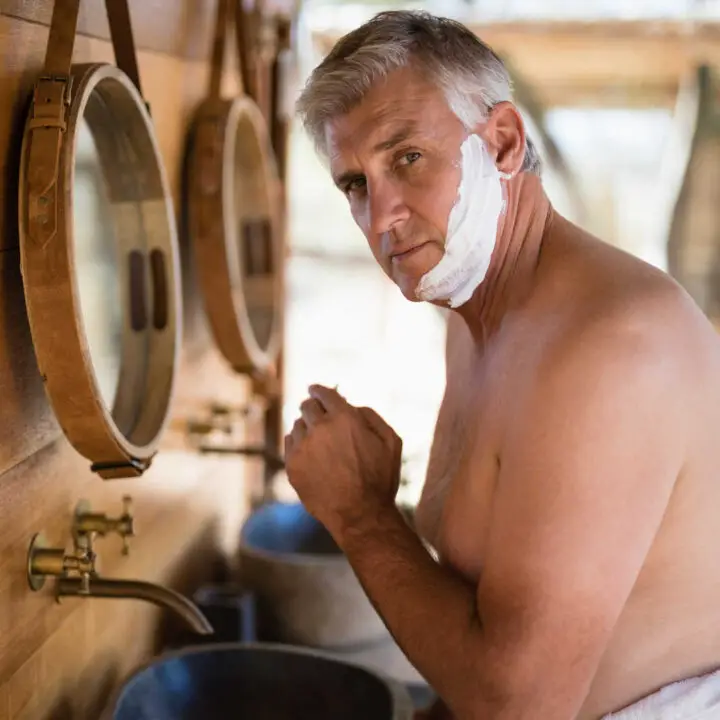
Hyperpigmentation from shaving can be triggered by several factors. These include:
– Skin sensitivity: Individuals with sensitive skin may experience more hyperpigmentation after shaving due to the trauma caused by the razor.
– Ingrown hairs: When the hair curls back into the skin, it can cause inflammation and lead to dark spots and discoloration.
– Melanin production: People with darker skin tones have more melanin in their skin, which can lead to higher likelihood of developing hyperpigmentation.
– Shaving techniques: Close or aggressive shaving techniques that irritate the skin can cause post-inflammatory hyperpigmentation.
– Exfoliation: Over-exfoliating before or after shaving can cause irritation and trigger dark spots on your skin.
– Skin lightening agents: Some topical products used for their lightening properties can make your skin more vulnerable to hyperpigmentation due to exposure to UV rays.
By understanding these triggers, you can take steps to prevent hyperpigmentation from shaving and keep your skin looking healthy and even-toned.
Conclusion: Living With Hyperpigmentation From Shaving And How To Manage It
Hyperpigmentation from shaving can be frustrating and difficult to manage. However, with the right techniques and care, it is possible to prevent and treat dark spots on the skin.
Proper pre-shave preparation, choosing the right products, and adopting effective shaving techniques can go a long way in preventing hyperpigmentation from occurring in the first place.
Solutions such as natural remedies, medical treatments for hyperpigmentation, and ingrown hair remedies can also help address existing issues. Remember to always take good care of your skin by maintaining proper hygiene routine and seeking professional advice if needed.
